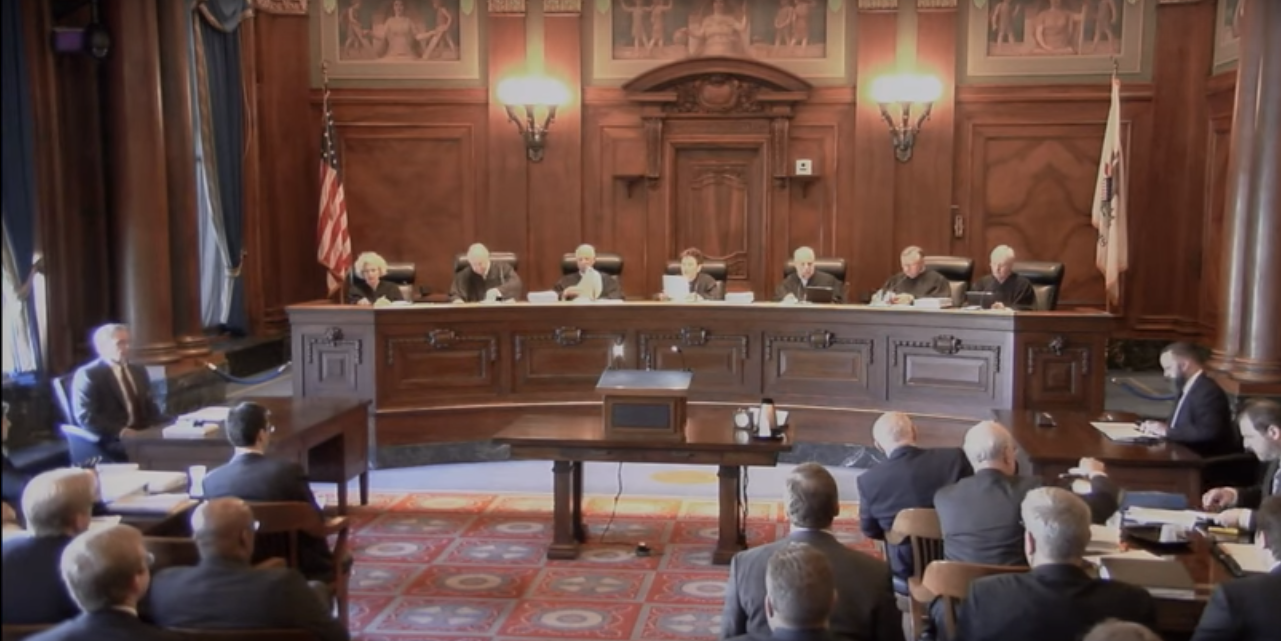The Illinois Supreme Court has ruled the state can’t stop labor union members from accruing state pension benefits while working for private unions, if those benefits are promised under a contract.
Justice Robert Thomas wrote the unanimous opinion issued Nov. 29 in a dispute over a 2012 state law that involves nine people who worked for the city or Chicago Board of Education. Collectively they belonged to three different public pension funds, all named as defendants. Three labor unions intervened as plaintiffs. The Illinois Attorney General’s Office defended the constitutionality of the law.
Thomas outlined the two concerns of the 2012 law — one eliminating a worker’s opportunity to pay into pension funds and earn credit for time worked while on a leave of absence, and one amending the law so only a salary paid by a defined public employer could be used to calculate the highest average annual salary used to determine pension payments.
The state argued the Illinois Constitution’s pension clause doesn’t protect the right to earn service credit for private employment with a union, as the worker isn’t doing public service or encouraged to return to public service.
Thomas explained the circuit court ruling finding that clause unconstitutional was based on the reasoning the amendment “took away a retirement benefit that the Legislature had previously granted,” and doing so violates the pension protection clause, which forbids the state or other government from taking actions which “diminish or impair” public workers’ retirement benefits.
He further explained the benefit in question was available to all nine plaintiffs at the time they started working for the government, and as such should remain available to them until they retire, even if they hadn’t exercised the option before the law changed. The only question is whether the arrangement is a contractually guaranteed benefit, and “speculation” that no one intended it to be protected as such “appears to be manifestly inaccurate,” Thomas wrote.
The salary calculations clause affected two pension funds, Laborers’ and Retirement Board Employees’ Annuity and Benefit Fund of Chicago and the Municipal Employees’ Annuity and Benefit Fund of Chicago. The workers said before the law changed they could use salaries earned while working directly for their union to establish a base figure for pension allocations. The state said the amendment didn’t change the pension code “because it always unambiguously required that the salary to be used for calculating the pension was to be the salary attached to the government position in which the employee actually worked or from which he was on leave of absence,” Thomas wrote.
However, the justices found the pre-amendment pension code ambiguous, as “work done on a union leave of absence is ‘indisputably a period of service,’ ” Thomas wrote, and the ultimate figure is the “highest average annual salary for any consecutive four years in the last 10 years of service,” per the code, which doesn’t specifically say a union salary can’t be included in the calculation.
Using the state’s position, Thomas wrote, “would arguably create an absurd result” as that reading would conflict with other parts of the pension code that allow workers to retire even while on a leave of absence for more than six years. Such an approach could effectively leave some workers with no eligible salary figures for calculating their pensions.
Although the 2012 law created a new method for calculating salaries for such employees — by using the largest annual averages salary from before a leave of absence, adjusted for inflation — the justices ultimately determined the new system diminishes the plaintiffs’ benefits and likewise violates the pension protection clause. The justices affirmed the circuit court’s rulings on both motions.
The plaintiffs also said the circuit court erred in denying their motion for summary judgment, in which they asked for a declaration that the Pension Code’s “any pension plan” language doesn’t apply to defined contribution plans, such as a 401(k). Some of the plaintiffs stand to lose significant union service credit since they gave to a defined contribution plan through a union job while on a leave of absence from government work.
The funds said the law is clear and that the notion of receiving credit is not limited to work service time but also covers the balance in a retirement account. But the justices sided with the workers, drawing a distinction between pension plans — which have defined benefits — and retirement savings, which would not have been confused for pensions when the relevant provision was enacted in 1987. As such, those workers still are allowed to take credit for time spent as union members while on leave from a government job.
According to Cook County court records, the plaintiffs are represented by attorneys with the firm of Dowd Bloch Bennett Cervone Auerbach & Yokich, of Chicago.
